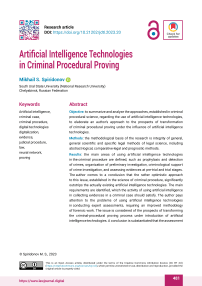Artificial Intelligence Technologies in Criminal Procedural Proving
Автор: Spiridonov M. S.
Журнал: Journal of Digital Technologies and Law @lawjournal-digital
Статья в выпуске: 1 (2), 2023 года.
Бесплатный доступ
Objective: to summarize and analyze the approaches, established in criminal procedural science, regarding the use of artificial intelligence technologies, to elaborate an author’s approach to the prospects of transformation of criminal procedural proving under the influence of artificial intelligence technologies. Methods: the methodological basis of the research is integrity of general, general scientific and specific legal methods of legal science, including abstract-logical, comparative-legal and prognostic methods. Results: the main areas of using artificial intelligence technologies in the criminal procedure are defined, such as prophylaxis and detection of crimes, organization of preliminary investigation, criminological support of crime investigation, and assessing evidences at pre-trial and trial stages. The author comes to a conclusion that the rather optimistic approach to this issue, established in the science of criminal procedure, significantly outstrips the actually existing artificial intelligence technologies. The main requirements are identified, which the activity of using artificial intelligence in collecting evidences in a criminal case should satisfy. The author pays attention to the problems of using artificial intelligence technologies in conducting expert assessments, requiring an improved methodology of forensic work. The issue is considered of the prospects of transforming the criminal-procedural proving process under introduction of artificial intelligence technologies. A conclusion is substantiated that the assessment of evidences with mathematical algorithms, in which preset values of each evidence quality are used, contradict to the principle of free assessment of evidences in the criminal procedure. The author comes to a conclusion that today there are no sufficient grounds for endowing artificial intelligence with legal personality during proving. Scientific novelty: the work presents an attempt to consider the role of artificial intelligence in the criminal-procedural proving; it specifies the requirements to be met by this technology during evidences collection and analyzes the prospects of transforming the proving process under the introduction of artificial intelligence technologies. Practical significance: the main provisions and conclusions of the research can be used to improve a mechanism of legal regulation of artificial intelligence technologies in the criminal procedure.
Artificial intelligence, criminal case, criminal procedure, digital technologies digitalization, evidence, judicial procedure, law, neural network, proving
Короткий адрес: https://sciup.org/14127034
IDR: 14127034 | DOI: 10.21202/jdtl.2023.20


